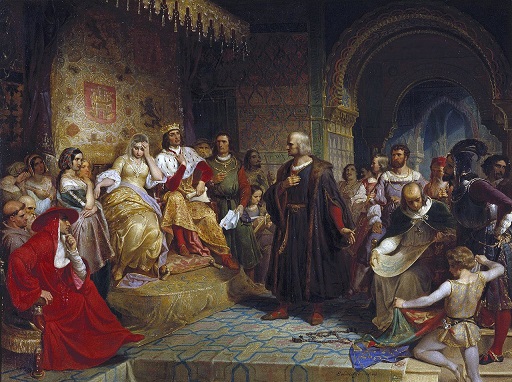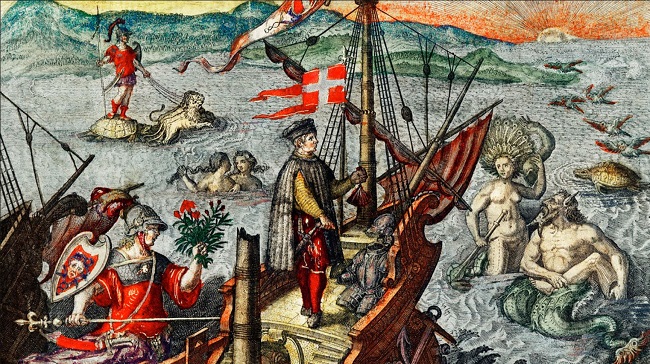By Robert Petrone
Christopher Columbus was none of the epithets with which his detractors repeatedly characterize him—and all of the historical resources show this unequivocally.
In an introduction to this series of articles about Christopher Columbus that I presented a few days ago, I included a brief summary of my credentials and sources; the local socio-political factors that make this serial exposé necessary; and the theme of this series. That theme is this: that Christopher Columbus was not only the man who single-handedly ushered humanity out of the Middle Ages and into a new era of intercontinental fraternity by bringing to light to the rest of the world the existence of the American continents, but he was also the Americas’ (1) progenitor of Western Culture, (2) first “Founding Father” and (3) first civil rights activist. This astounding list of deeds, which I dare say no one since has matched, makes Christopher Columbus, beyond cavil, the greatest hero of the Fifteenth and Sixteenth Centuries by any standard.
How this unique, self-educated genius managed to defy not only the medieval ideologies of his time, but also the sizable, war-mongering, political forces that opposed him, and accomplished all his unparalleled deeds in the face of them, is revealed by his humble beginnings. A man of no rank and no formal education, Cristoforo Colombo came into the world in the latter half of 1451, the son of poor, Catholic, Genoan wool-weavers. His parents named him, perhaps prophetically, after St. Christopher, the patron saint of travelers, whose most famous legend tells that the surefooted Canaanite crossed a body of water carrying with him the most singular asset of Christendom, the Christ Child himself. Like his namesake, Columbus, too, would carry Christendom across the deep, but a long road lay ahead of him before he could achieve that world-changing feat.
The young Cristoforo Colombo educated himself. He studied the writings of, among others, the Greco-Roman astronomer Ptolemy, the Phoenician geographer Marinus of Tyre, the Greek geographer Strabo, the Roman Philosopher Pliny the Elder, the Spanish scholar St. Isidore, and the French astronomer Pierre d’Ailly. In his seminal, primary historical source, Historia de las Indias (translated from the original 15th-Century Spanish as History of the Indies), the Protector of the Indians and New-World historian Bartolomé de las Casas contemporaneously recorded the settlement of the West Indies, beginning with a brief biography of Christopher Columbus.
…this unique, self-educated genius managed to defy not only the medieval ideologies of his time, but also the sizable, war-mongering, political forces that opposed him, and accomplished all his unparalleled deeds in the face of them…
De las Casas’s Historia was no propaganda fluff piece. He wrote extremely critically of his fellow Spaniards, in particular, the hidalgos (the low, landed nobles of Spain’s feudal “encomienda” system), and their treatment of the indigenes; so much so that modern Spaniards still regard his candid accounts to be a “black” mark on Spain’s history. In his profile of Columbus, however, the otherwise-censorious de las Casas described “the illustrious Genoese” as “good-natured, kind, daring, courageous, and pious,” and marveled at his many “acquired qualities,” including his masterful calligraphy, arithmetic, and drawing; his skill with Latin; his “unusual insight into human and divine affairs;” “good judgment;” “sound memory and eagerness to learn;” intense study; and “proficiency in geometry, geography, cosmography, astrology or astronomy, and seamanship.”

De las Casas noted that Columbus “avoided exaggeration” in authoring the many “documents of value” that have themselves become primary historical sources, such as his journals and correspondences with the Crown and Court of Spain. He emphasized Columbus’s “over forty years” of experience “in sailing all waters known today” and noted that Columbus’s autodidactic efforts included collaboration with scholars among the “Latins and Greeks, Jews and Moors, and many others of many other sects” (Historia de las Indias, Book I, 15). For a historian as hypercritical as de las Casas to cast Christopher Columbus in such a consistently favorable light speaks volumes of Columbus’s true character. History reveals Columbus to have been a worldly intellectual who did not discriminate against scholars of any race, religion, or creed in working with and learning from them.
…de las Casas described “the illustrious Genoese” as “good-natured, kind, daring, courageous, and pious,” and marveled at his many “acquired qualities”…
But Columbus was more than a mere theorist; he was a bona fide adventurer-scholar whose globetrotting, swashbuckling exploits were worthy of the pulp fiction of the early Twentieth Century. As a young man, still studying the arcana of the cartographers and astronomers that preceded him, he embarked on several remarkable maritime adventures that proved him the Indiana Jones of his day, including to Iceland, Ireland, and Africa. Not the least of these sojourns included passage on the ship of a Genoan privateer—also named Columbus but of no relation to Christopher—who was fighting on behalf of the doge (akin to a “duke”) of Genoa against the Venetians for dominance over the Mediterranean trade routes. The privateer’s ship was burned in a naval battle, and Christopher avoided the scorching, subaqueous sepulcher of Davy Jones by jumping overboard, grasping a floating oar, and swimming two leagues to shore — equivalent to seven miles for the landlubbers—where he convalesced from paralysis of his legs (Historia de las Indias, Book I, 18).
After a full recovery, the young Columbus traveled to Lisbon, Portugal, where he met and married Filipa Moniz Perestrelo, the daughter of a wealthy Portuguese hidalgo, Don Bartolomeu Perestrelo, also an accomplished mariner and explorer. Don Bartolomeu’s widow gifted her son-in-law her late husband’s navigational instruments and maps. Thenceforth, Christopher Columbus joined several Portuguese expeditions, ultimately establishing his early homestead in Puerto Santo of the Madeira Archipelago, an island Don Bartolomé himself had settled. There, Filipa gave birth to her and Christopher’s son Diego, but tragically died in childbirth (Historia de las Indias, Book I, 18).
In the grief of his widowhood, and despite the burdens of single-handedly raising a now-motherless newborn, the newly single father found solace in his staunch devotion to God and the quietude of contemplation of the collective works of the many, multicultural scholars he had studied. His insatiable yearning to return to the open sea inspired Columbus, in the spirit of the burgeoning scientific method, to conceptualize and operationalize a real-world experiment to test his hypothesis that an all-water route to Asia lay across the Atlantic. An “enterprise” of a possible nautical expedition westward to China became Columbus’s passion project. In what would become a dominant theme in Christopher Columbus’s life (and again now, over five centuries after his death), he pursued this endeavor in the face of virtually-universal derision; de las Casas wrote that “[e]veryone laughed at [Columbus] and dismissed [his proposed expedition] as a joke” (Id., 15-16).
Christopher Columbus would not be deterred. He was a man of science in an age of superstition, sovereigns and swords. The Dark Ages had only ended four and one-half centuries prior. While some scholars mark the end of the Middle Ages at the year 1300 and others at the year 1500, a third school of thought ends the Middle Ages firmly with the date of Christopher Columbus’s First Voyage: 1492. Like the birth of Christ — the event that reset the calendar for the Western World — Christopher Columbus was the worldwide singularity that ended the Middle Ages and ushered in the next era of human existence.
…He was a man of science in an age of superstition, sovereigns and swords…
The next installment in this series of the life and legacy of Christopher Columbus will based on the primary historical sources. It will detail his formulation of his scientific hypothesis and his quest for funding of his great experiment, his First Transatlantic Voyage to the Americas. More importantly, the next article and those to follow will leave the reader with no doubt that Christopher Columbus not only was not the villain the cultural majoritarians attempt to portray him as, but, in fact, was nothing less than the greatest hero of the Fifteenth and Sixteenth Centuries.
Robert Petrone, Esq. is a civil rights author and attorney, and an expert on Christopher Columbus.







